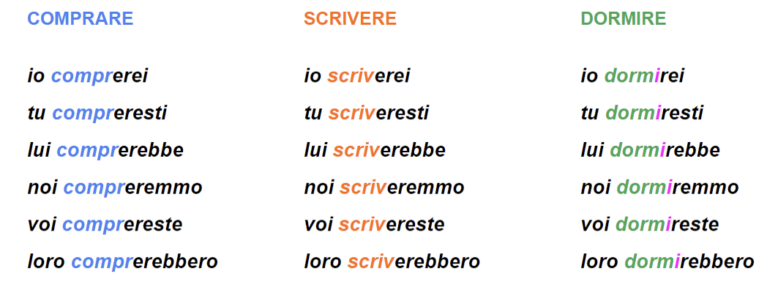The Italian conditional mood (il modo condizionale) gives us the possibility to formulate a sentence about what can or cannot happen in certain conditions. These conditions may be clearly stated, as in the formulation of a hypothesis, or implicit, as in the case of a polite request.
Moreover, these same conditions could actually be expired, or even immutable. In order to express these differences, the Italian language has two conditional tenses: the present (or simple) conditional and the past conditional.
Let’s start this article with a few examples where the use of the conditional mood is necessary.

When to Use the Conditional Mood
1. To make a polite request. This is a case in which the condition is implicit and may be found in the other person’s willingness to do a favor.
Vorrei un caffè, per favore.
I’d like a coffee, please.
Mi presteresti la tua bicicletta domani? Ho portato la mia a riparare.
Could you lend me your bike tomorrow? I took mine in for repair.
2. To say that something is likely to happen.
Se queste nuvole non vanno via, potrebbe piovere.
If these clouds don’t go away, it could rain.
Continuando a lavorare, potremmo ottenere degli ottimi risultati.
By continuing to work hard, we could achieve excellent results.
3. To make a wish.
Mi piacerebbe visitare New York un giorno.
I would like to visit New York one day.
Avrei voluto* incontrarti prima.
I wish I had met you sooner.
4. To give advice, to express a doubt.
Sarebbe meglio fare un po’ di esperienza sul campo.
It would be better to get some experience in the field.
Forse sarebbe stato* meglio aspettare, che ne dici?
Maybe it would have been better to wait, what do you think?
*Past Conditional Tense
The Purpose of the Past Conditional
We will see how to construct the present and the past conditional tenses later on in the article. However, I would first like to mention some important information about the latter.
The past conditional has the same nature as the present conditional, but you use it specifically when you have to:
1. Mention an action that cannot be changed.
Sarei andato in vacanza con loro, ma dovevo lavorare.
I would have gone on holiday with them, but I had to work.
2. Express a future action in the past:
Hanno detto che il pacco sarebbe arrivato in un paio di giorni, ma lo stiamo ancora aspettando.
They said the package would arrive* in a couple of days, but we are still waiting for it.
*Although this is the correct form in English, the literal translation of the Italian form would be “would have arrived”.
The Conditional Mood in Italian and English
In the examples above, you’ve probably noticed that the Italian conditional tenses are expressed in English with the auxiliary verbs would, could and should. Well, we need to check these translations a little more attentively.
1. Generally speaking, an Italian conditional verb can be translated into English with would.
- Mangiare / to eat → mangerei / I would eat
- Mettere / to put → metterei / I would put
- Uscire / to go out → uscirei / I would go out
2. However, if an infinitive verb is preceded by the conditional tense of the Italian modals dovere or potere, there are different possible translations, depending on the context of the sentence.
– The present conditional tense of dovere corresponds to should, to be supposed to, ought to.
– The present conditional tense of potere corresponds to could, may, might.

Examples:
Dovresti avvisare la segreteria.
You should notify the secretary.
Non dovrebbero parcheggiare lì.
They’re not supposed to park there.
Potresti richiamarmi più tardi?
Could you please call me back later?
Sara potrebbe ancora avere bisogno di questo libro.
Sara may still need this book.
3. A separate case are the conditionals of the verbs volere / to want and piacere / to like which in English both become would like. For an in-depth explanation about this, I recommend reading this article: Mi piacerebbe vs Vorrei – Two ways to say “I would like” in Italian.
- volere → io vorrei → I would like
- piacere → mi piacerebbe → I would like
Examples:
Vorrei uscire più spesso.
I would like to go out more often.
Mi piacerebbe andare al cinema.
I would like to go to the cinema.
Construction of the Present and Past Conditional
You have probably already noticed in the first examples that the present conditional tense is made up of a single word while the past conditional is a compound tense. Now let’s see, step by step, how to construct both of these tenses of the Italian conditional mood.
How to form the Present Conditional
1. With regular verbs all you need to do is replace the endings –are, -ere, -ire of the infinitive forms with the new appropriate endings which are exactly the same for –are and –ere, while the first -e becomes an -i for the ending –ire.

Please note the double -m of the first person plural: noi comprereMMo, noi scrivereMMo, noi dormireMMo. If you write (and pronounce) it with one -m only, you wouldn’t be using the present conditional, but the future tense of the indicative mood.
2. Verbs ending in -care and -gare maintain the “hard” sound thanks to the letter -h.
- cercare → io cercherei, tu cercheresti..
- to look for → I would look for, you look for..
- pagare → io pagherei, tu pagheresti..
- to pay → I would pay, you would pay..
3. With verbs ending in -ciare and –giare you’ll have to drop the letter -i.
- cominciare → io comincerei, tu cominceresti..
- to begin → I would begin, you would begin..
- mangiare → io mangerei, tu mangeresti..
- to eat → I would eat, you would eat..
4. Certain important verbs will have a contraction of the endings (the first -e drops).
- avere → io avrei, tu avresti..
- to have→ I would have, you would have..
- potere → io potrei, tu potresti..
- to can → I could, you could..
- dovere → io dovrei, tu dovresti..
- should → I should, you should.
- sapere → io saprei, tu sapresti..
- to know → I would know, you would know..
- andare → io andrei, tu andresti..
- to go → I would go, you would go..
5. Sometimes, when verbs undergo a contraction, as seen in point 4, the -r doubles.
- venire → io verrei, tu verresti..
- to come → I would come, you would come..
- volere → io vorrei, tu vorresti..
- to want→ I would like, you would like..
- bere → io berrei, tu berresti..
- drink → I would drink, you would drink..
- tenere → io terrei, tu terresti..
- to keep → I would keep , you would keep..
6. Some verbs have a change in their root.
Dare, fare and stare keep the letter -a in the conditional ending too.
- io darei, tu daresti..
- I would give, you would give…
- io farei, tu faresti..
- I would do it, you would do it…
- io starei, tu staresti..
- I would stay, you would stay…
The verb essere / to be changes its root completely.
- io sarei / I would be
- tu saresti / you would be
- lui sarebbe / he would be
- noi saremmo / we would be
- voi sareste / you would be
- loro sarebbero / they would be
How to form the Past Conditional
The past conditional is formed by an auxiliary in its conditional form followed by the past participle.
As for other compound tenses (for instance, the passato prossimo), the auxiliary verb can be either essere or avere.
You can revise the use and the choice of essere and avere as auxiliary verbs in part 3 of my article: When to Use ‘Essere’ or ‘Avere’ in Italian.
Examples with essere as auxiliary verb:
Andare → io sarei andato / I would have gone
Partire → tu saresti partito / you would have left
Rimanere → lei sarebbe rimasta / she would have stayed
Uscire → noi saremmo usciti / we would have gone out
Cambiare → voi sareste cambiati / you would have changed
Diventare → loro sarebbero diventati / they would have become
Examples with avere as auxiliary verb:
Credere → io avrei creduto / I would have believed
Capire → tu avresti capito / you would have understood
Fare → lui avrebbe fatto / he would have done
Ascoltare → noi avremmo ascoltato / we would have listened
Parlare → voi avreste parlato / you would have spoken
Dormire → loro avrebbero dormito / they would have slept
The Conditional Tenses in the Hypothetical Phrases
In conclusion it is necessary to briefly mention the periodo ipotetico / hypothetical clause. This is a syntactic construction in which a condition (or a supposition) is clearly stated and introduced by the conjunction se / if.
There are three types of periodo ipotetico in Italian.
1st type: a real hypothesis → No Conditional Tense
The first type corresponds to the English first and zero conditional and does not require the use of the conditional tense for its construction. It expresses something that is possible or really probable, and it is constructed as follows:
a tense of the Indicative Mood + a tense of the Indicative Mood
or
a tense of the Indicative Mood + Imperative Mood
A few examples:
Indicative Present + Indicative Present:
Se piove, non esco.
If it rains, I don’t go out.
Indicative Simple Future + Indicative Simple Future:
Se pioverà, non uscirò.
If it is going to rain, I won’t go out.
Indicative Present + Imperative:
Se non piove, esci!
If it’s not raining, go out!
2nd type: a possible hypothesis → Present Conditional
The second type corresponds to the English second conditional and it expresses something that might happen or that is still possible although improbable. It requires this construction:
Imperfect Subjunctive + Present Conditional:
Se fosse una bella giornata, uscirei.
If it were a nice day, I would go out.
3rd type: a impossible hypothesis → Present or Past Conditional
The third type corresponds to the third conditional and describes a past situation which cannot be altered. As the conditions can not be modified, you can only make hypotheses about what could have happened. The third type can be constructed in two ways:
1. Past Perfect Subjunctive + Present Conditional:
Se mi fossi ricordato di comprare le uova, adesso farei una frittata.
If I had remembered to buy eggs, I would make an omelette right now.
2. Past Perfect Subjunctive + Past Conditional:
Se (tu) fossi stato più attento, non avresti bruciato l’arrosto.
If you had been more careful, you wouldn’t have burned the roast.
However, alongside this standard form, in everyday spoken Italian the preferred tense could be the imperfect indicative instead of the present and past conditional (this is because it’s easier and “quicker” to use). The examples seen above would then become:
1. Past Perfect Subjunctive + Imperfect Indicative (instead of Present Conditional):
Se mi fossi ricordata di comprare le uova, adesso facevo una frittata.
2. Past Perfect Subjunctive + Imperfect Indicative (instead of Past Conditional):
Se (tu) fossi stato più attento, non bruciavi l’arrosto.
Actually this simplification of the hypothetical structure could also concern the subjunctive tense in the first part of the periodo ipotetico of the third or of the second type. The indicative imperfect would then be the only tense used, but in this case we would have a “substandard” variant of the Italian language.
1. Imperfect Indicative + Imperfect Indicative
(instead of Past Perfect Subjunctive + Present Conditional)
Se mi ricordavo di comprare le uova, adesso facevo una frittata.
2. Imperfect Indicative + Imperfect Indicative
(instead of Past Perfect Subjunctive + Past Conditional)
Se (tu) eri più attento, non bruciavi l’arrosto.
You can find part of this explanation in Italian on Nicco’s website: ditelab.blogspot.com

Niccolò Curini has been teaching Italian since February 2016, primarily at the Language Center of the University of Goettingen in Germany. In this role, he led courses ranging from level A1 to B2. To qualify for this position, he obtained the DITALS certification, enabling him to teach Italian as a Foreign Language to university students. Social media: Instagram – Facebook – Twitter


